Ethics and Governance Report: Financial Misconduct at Vroom Limited
VerifiedAdded on 2020/04/07
|8
|1668
|46
Report
AI Summary
This report analyzes ethical and governance issues within the context of Vroom Limited, examining a scenario involving financial misconduct and pressure to manipulate financial statements. The report details the stakeholders involved, including the manager, accountant, and shareholders, and explores the ethical dilemmas arising from attempts to defer revenue recognition and manipulate bonus structures. It discusses the unethical nature of such practices, emphasizing the importance of accurate financial reporting and adherence to accounting principles. Furthermore, the report provides examples of breaches of ethical standards by professional organizations, highlighting the consequences of non-compliance and referencing specific cases and relevant standards like APES 110. The analysis underscores the critical need for ethical behavior and sound governance in financial management to maintain stakeholder trust and ensure the integrity of financial reporting.
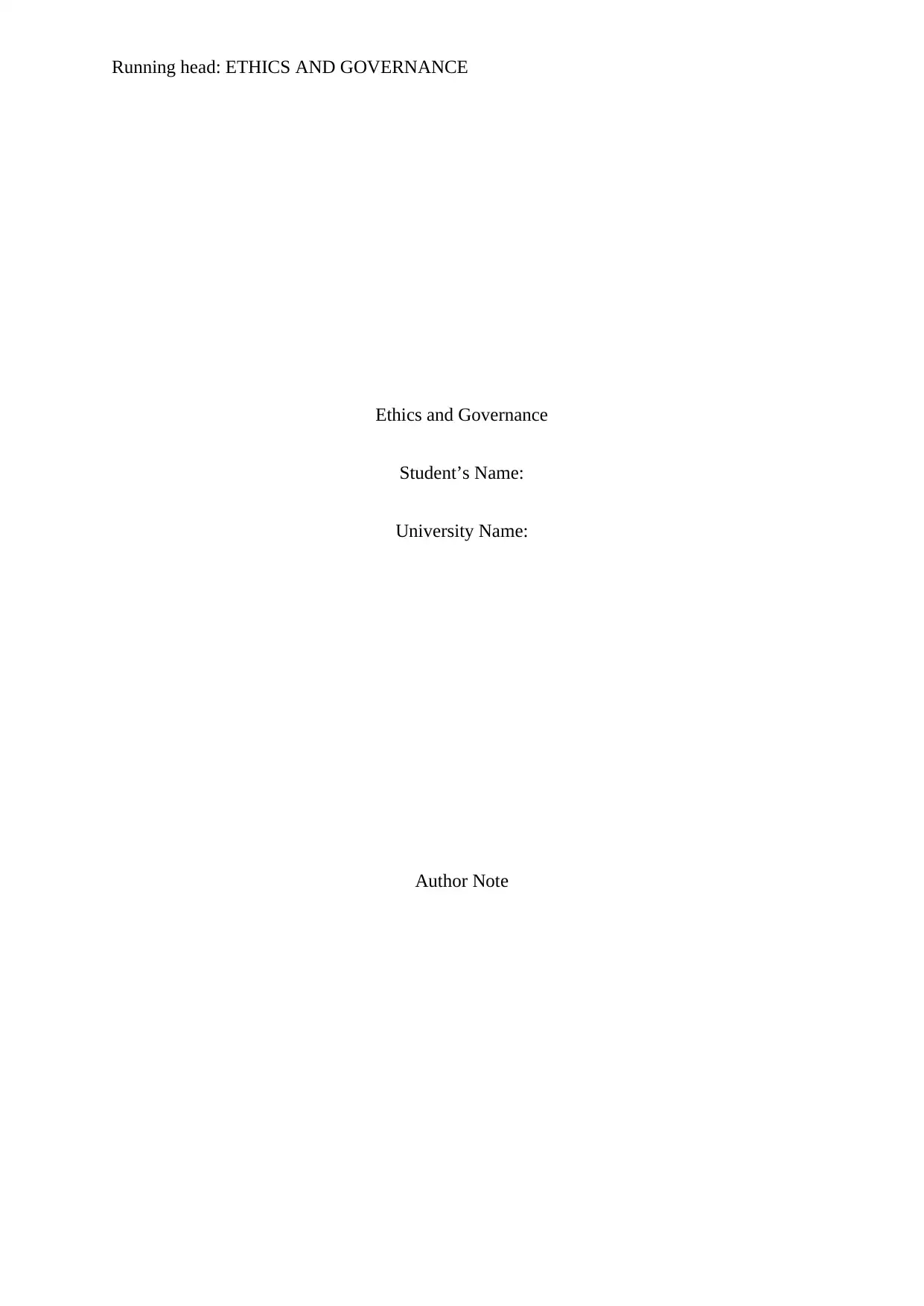
Running head: ETHICS AND GOVERNANCE
Ethics and Governance
Student’s Name:
University Name:
Author Note
Ethics and Governance
Student’s Name:
University Name:
Author Note
Paraphrase This Document
Need a fresh take? Get an instant paraphrase of this document with our AI Paraphraser
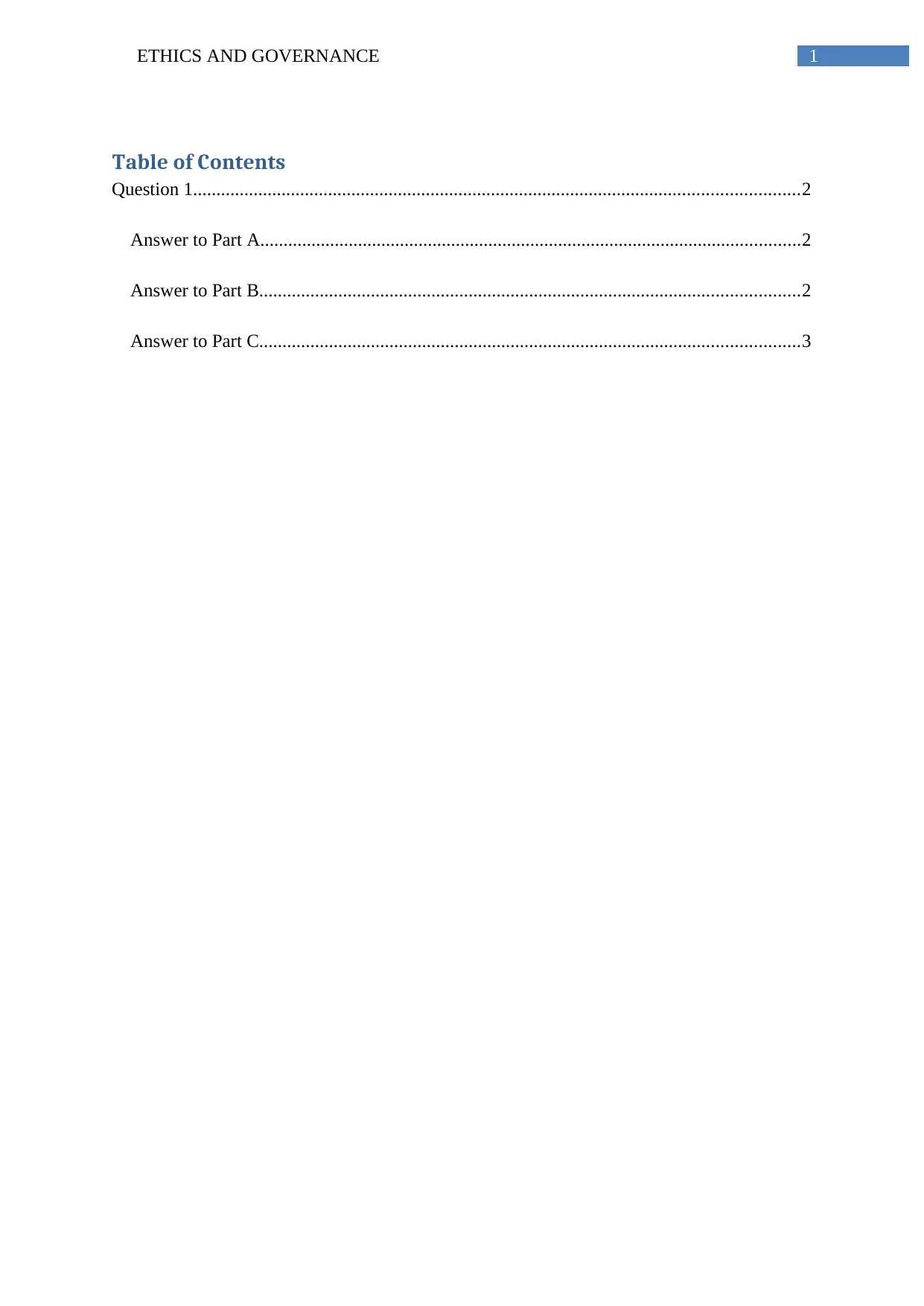
1ETHICS AND GOVERNANCE
Table of Contents
Question 1..................................................................................................................................2
Answer to Part A....................................................................................................................2
Answer to Part B....................................................................................................................2
Answer to Part C....................................................................................................................3
Table of Contents
Question 1..................................................................................................................................2
Answer to Part A....................................................................................................................2
Answer to Part B....................................................................................................................2
Answer to Part C....................................................................................................................3
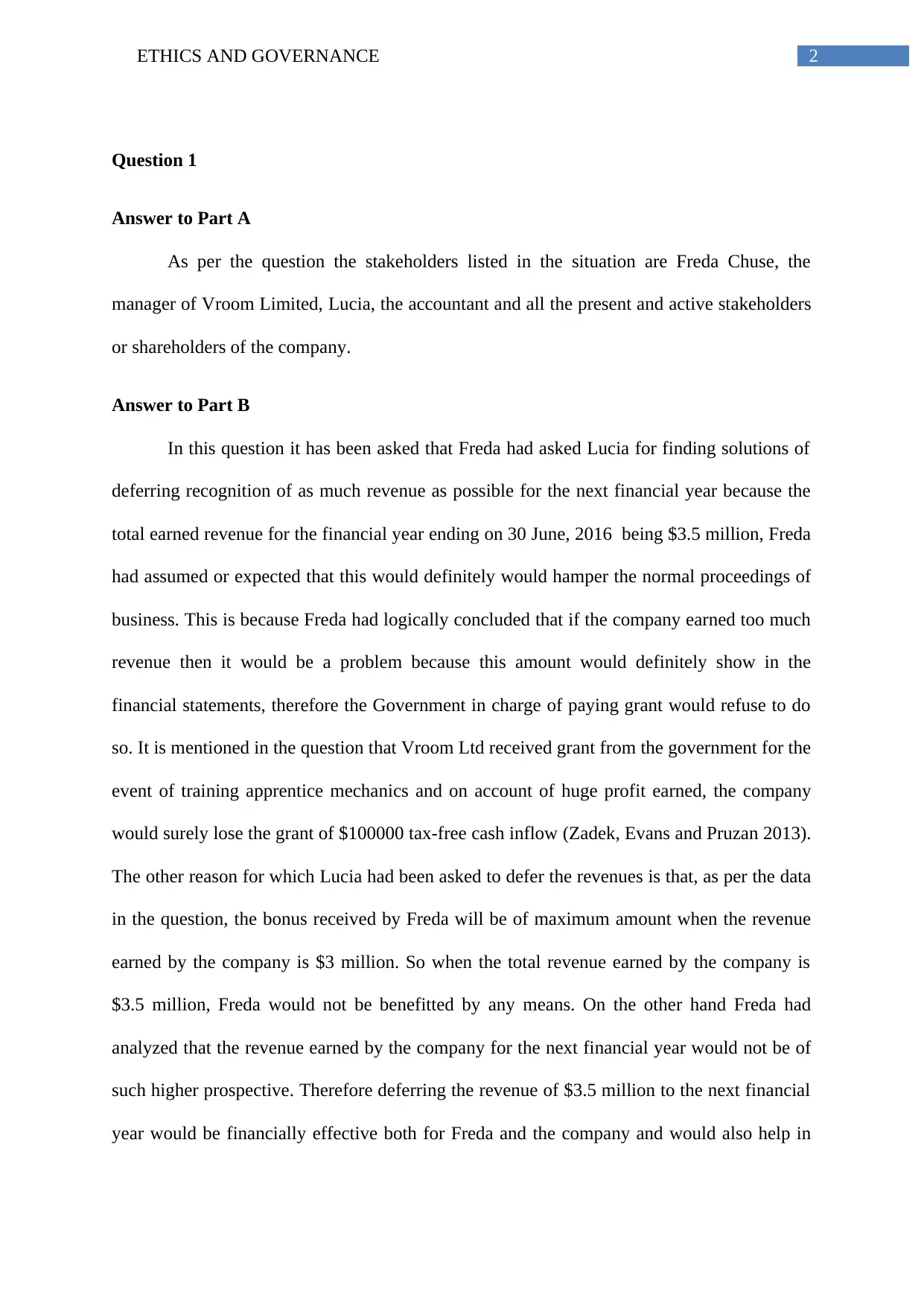
2ETHICS AND GOVERNANCE
Question 1
Answer to Part A
As per the question the stakeholders listed in the situation are Freda Chuse, the
manager of Vroom Limited, Lucia, the accountant and all the present and active stakeholders
or shareholders of the company.
Answer to Part B
In this question it has been asked that Freda had asked Lucia for finding solutions of
deferring recognition of as much revenue as possible for the next financial year because the
total earned revenue for the financial year ending on 30 June, 2016 being $3.5 million, Freda
had assumed or expected that this would definitely would hamper the normal proceedings of
business. This is because Freda had logically concluded that if the company earned too much
revenue then it would be a problem because this amount would definitely show in the
financial statements, therefore the Government in charge of paying grant would refuse to do
so. It is mentioned in the question that Vroom Ltd received grant from the government for the
event of training apprentice mechanics and on account of huge profit earned, the company
would surely lose the grant of $100000 tax-free cash inflow (Zadek, Evans and Pruzan 2013).
The other reason for which Lucia had been asked to defer the revenues is that, as per the data
in the question, the bonus received by Freda will be of maximum amount when the revenue
earned by the company is $3 million. So when the total revenue earned by the company is
$3.5 million, Freda would not be benefitted by any means. On the other hand Freda had
analyzed that the revenue earned by the company for the next financial year would not be of
such higher prospective. Therefore deferring the revenue of $3.5 million to the next financial
year would be financially effective both for Freda and the company and would also help in
Question 1
Answer to Part A
As per the question the stakeholders listed in the situation are Freda Chuse, the
manager of Vroom Limited, Lucia, the accountant and all the present and active stakeholders
or shareholders of the company.
Answer to Part B
In this question it has been asked that Freda had asked Lucia for finding solutions of
deferring recognition of as much revenue as possible for the next financial year because the
total earned revenue for the financial year ending on 30 June, 2016 being $3.5 million, Freda
had assumed or expected that this would definitely would hamper the normal proceedings of
business. This is because Freda had logically concluded that if the company earned too much
revenue then it would be a problem because this amount would definitely show in the
financial statements, therefore the Government in charge of paying grant would refuse to do
so. It is mentioned in the question that Vroom Ltd received grant from the government for the
event of training apprentice mechanics and on account of huge profit earned, the company
would surely lose the grant of $100000 tax-free cash inflow (Zadek, Evans and Pruzan 2013).
The other reason for which Lucia had been asked to defer the revenues is that, as per the data
in the question, the bonus received by Freda will be of maximum amount when the revenue
earned by the company is $3 million. So when the total revenue earned by the company is
$3.5 million, Freda would not be benefitted by any means. On the other hand Freda had
analyzed that the revenue earned by the company for the next financial year would not be of
such higher prospective. Therefore deferring the revenue of $3.5 million to the next financial
year would be financially effective both for Freda and the company and would also help in
⊘ This is a preview!⊘
Do you want full access?
Subscribe today to unlock all pages.

Trusted by 1+ million students worldwide
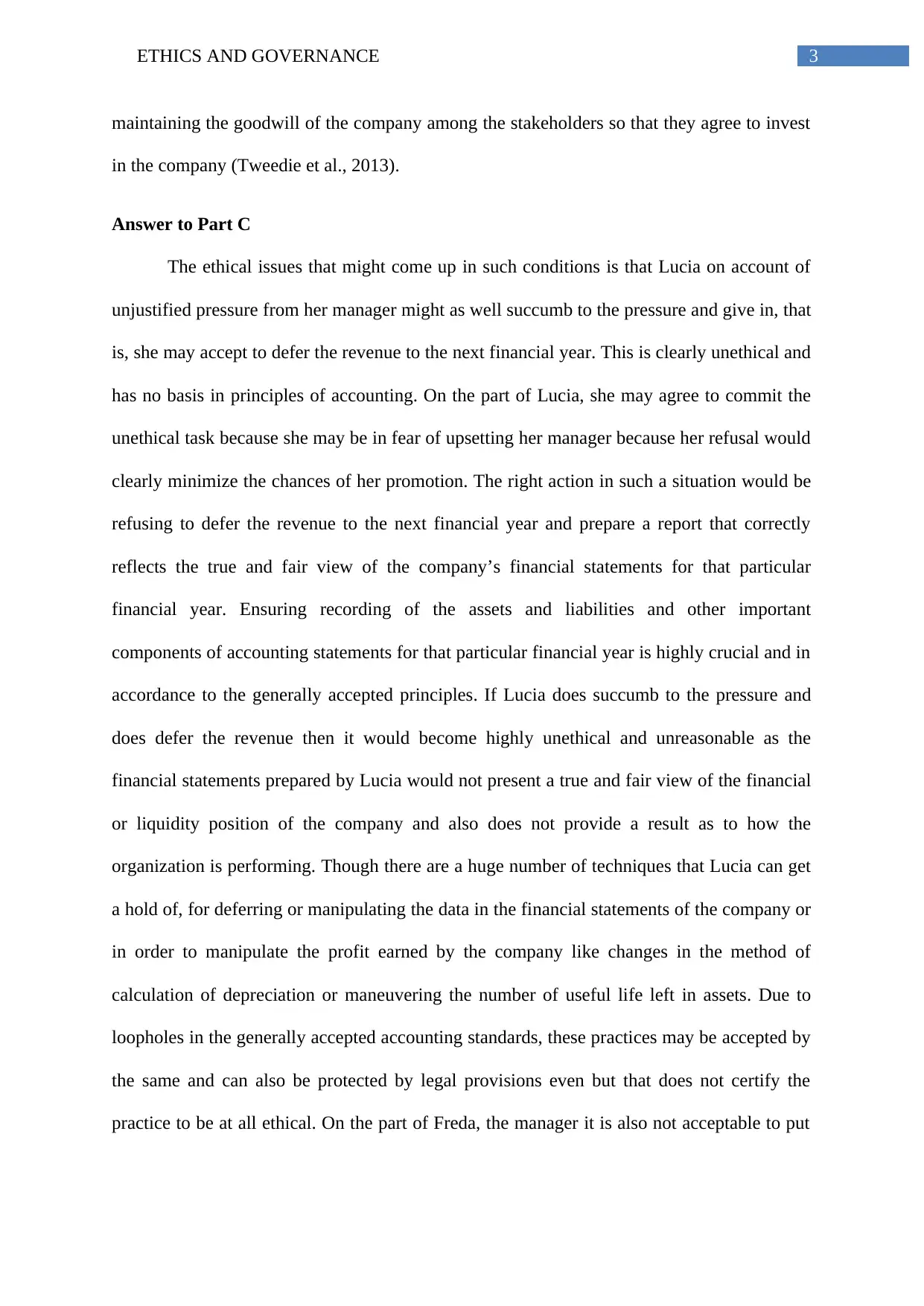
3ETHICS AND GOVERNANCE
maintaining the goodwill of the company among the stakeholders so that they agree to invest
in the company (Tweedie et al., 2013).
Answer to Part C
The ethical issues that might come up in such conditions is that Lucia on account of
unjustified pressure from her manager might as well succumb to the pressure and give in, that
is, she may accept to defer the revenue to the next financial year. This is clearly unethical and
has no basis in principles of accounting. On the part of Lucia, she may agree to commit the
unethical task because she may be in fear of upsetting her manager because her refusal would
clearly minimize the chances of her promotion. The right action in such a situation would be
refusing to defer the revenue to the next financial year and prepare a report that correctly
reflects the true and fair view of the company’s financial statements for that particular
financial year. Ensuring recording of the assets and liabilities and other important
components of accounting statements for that particular financial year is highly crucial and in
accordance to the generally accepted principles. If Lucia does succumb to the pressure and
does defer the revenue then it would become highly unethical and unreasonable as the
financial statements prepared by Lucia would not present a true and fair view of the financial
or liquidity position of the company and also does not provide a result as to how the
organization is performing. Though there are a huge number of techniques that Lucia can get
a hold of, for deferring or manipulating the data in the financial statements of the company or
in order to manipulate the profit earned by the company like changes in the method of
calculation of depreciation or maneuvering the number of useful life left in assets. Due to
loopholes in the generally accepted accounting standards, these practices may be accepted by
the same and can also be protected by legal provisions even but that does not certify the
practice to be at all ethical. On the part of Freda, the manager it is also not acceptable to put
maintaining the goodwill of the company among the stakeholders so that they agree to invest
in the company (Tweedie et al., 2013).
Answer to Part C
The ethical issues that might come up in such conditions is that Lucia on account of
unjustified pressure from her manager might as well succumb to the pressure and give in, that
is, she may accept to defer the revenue to the next financial year. This is clearly unethical and
has no basis in principles of accounting. On the part of Lucia, she may agree to commit the
unethical task because she may be in fear of upsetting her manager because her refusal would
clearly minimize the chances of her promotion. The right action in such a situation would be
refusing to defer the revenue to the next financial year and prepare a report that correctly
reflects the true and fair view of the company’s financial statements for that particular
financial year. Ensuring recording of the assets and liabilities and other important
components of accounting statements for that particular financial year is highly crucial and in
accordance to the generally accepted principles. If Lucia does succumb to the pressure and
does defer the revenue then it would become highly unethical and unreasonable as the
financial statements prepared by Lucia would not present a true and fair view of the financial
or liquidity position of the company and also does not provide a result as to how the
organization is performing. Though there are a huge number of techniques that Lucia can get
a hold of, for deferring or manipulating the data in the financial statements of the company or
in order to manipulate the profit earned by the company like changes in the method of
calculation of depreciation or maneuvering the number of useful life left in assets. Due to
loopholes in the generally accepted accounting standards, these practices may be accepted by
the same and can also be protected by legal provisions even but that does not certify the
practice to be at all ethical. On the part of Freda, the manager it is also not acceptable to put
Paraphrase This Document
Need a fresh take? Get an instant paraphrase of this document with our AI Paraphraser
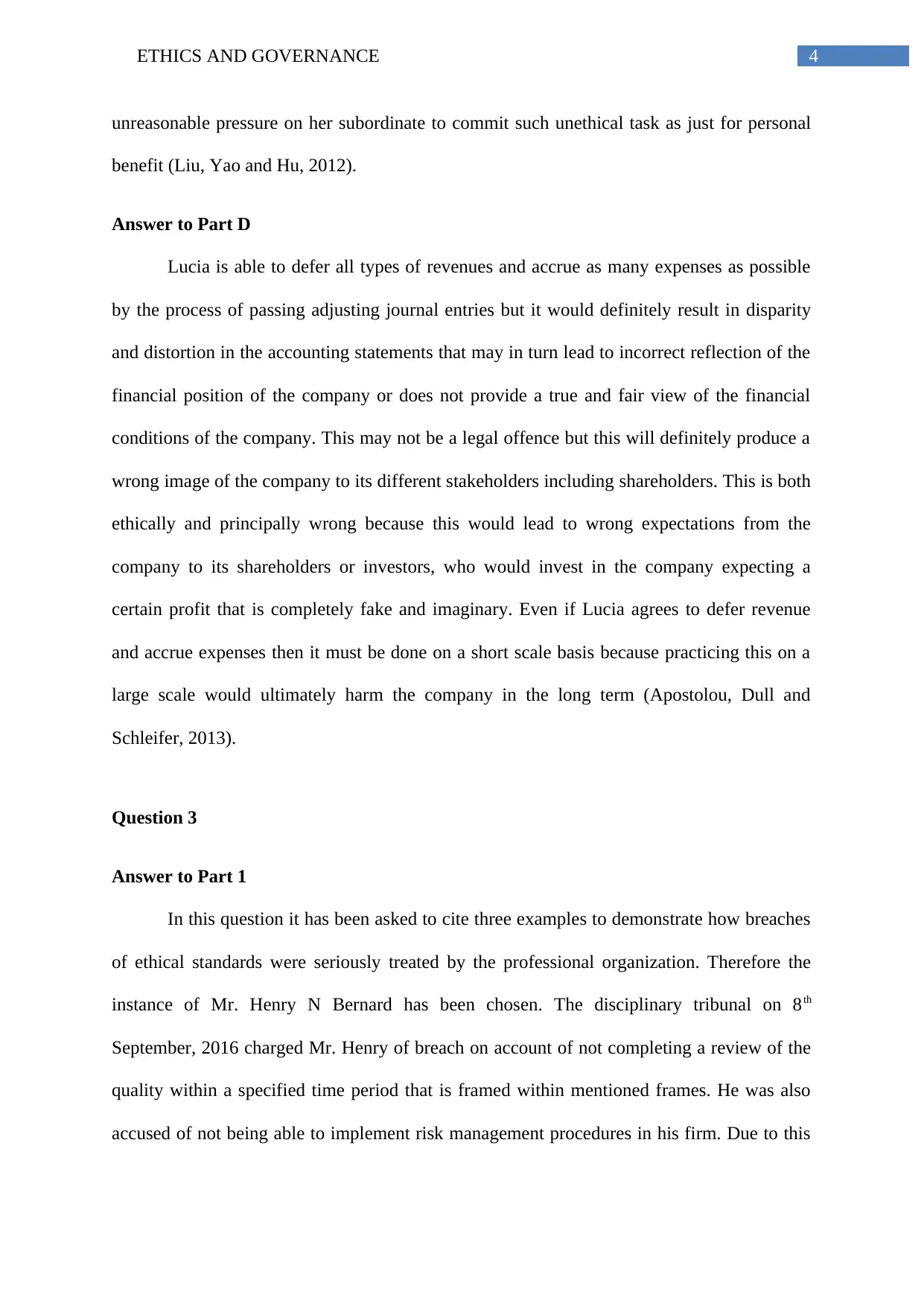
4ETHICS AND GOVERNANCE
unreasonable pressure on her subordinate to commit such unethical task as just for personal
benefit (Liu, Yao and Hu, 2012).
Answer to Part D
Lucia is able to defer all types of revenues and accrue as many expenses as possible
by the process of passing adjusting journal entries but it would definitely result in disparity
and distortion in the accounting statements that may in turn lead to incorrect reflection of the
financial position of the company or does not provide a true and fair view of the financial
conditions of the company. This may not be a legal offence but this will definitely produce a
wrong image of the company to its different stakeholders including shareholders. This is both
ethically and principally wrong because this would lead to wrong expectations from the
company to its shareholders or investors, who would invest in the company expecting a
certain profit that is completely fake and imaginary. Even if Lucia agrees to defer revenue
and accrue expenses then it must be done on a short scale basis because practicing this on a
large scale would ultimately harm the company in the long term (Apostolou, Dull and
Schleifer, 2013).
Question 3
Answer to Part 1
In this question it has been asked to cite three examples to demonstrate how breaches
of ethical standards were seriously treated by the professional organization. Therefore the
instance of Mr. Henry N Bernard has been chosen. The disciplinary tribunal on 8th
September, 2016 charged Mr. Henry of breach on account of not completing a review of the
quality within a specified time period that is framed within mentioned frames. He was also
accused of not being able to implement risk management procedures in his firm. Due to this
unreasonable pressure on her subordinate to commit such unethical task as just for personal
benefit (Liu, Yao and Hu, 2012).
Answer to Part D
Lucia is able to defer all types of revenues and accrue as many expenses as possible
by the process of passing adjusting journal entries but it would definitely result in disparity
and distortion in the accounting statements that may in turn lead to incorrect reflection of the
financial position of the company or does not provide a true and fair view of the financial
conditions of the company. This may not be a legal offence but this will definitely produce a
wrong image of the company to its different stakeholders including shareholders. This is both
ethically and principally wrong because this would lead to wrong expectations from the
company to its shareholders or investors, who would invest in the company expecting a
certain profit that is completely fake and imaginary. Even if Lucia agrees to defer revenue
and accrue expenses then it must be done on a short scale basis because practicing this on a
large scale would ultimately harm the company in the long term (Apostolou, Dull and
Schleifer, 2013).
Question 3
Answer to Part 1
In this question it has been asked to cite three examples to demonstrate how breaches
of ethical standards were seriously treated by the professional organization. Therefore the
instance of Mr. Henry N Bernard has been chosen. The disciplinary tribunal on 8th
September, 2016 charged Mr. Henry of breach on account of not completing a review of the
quality within a specified time period that is framed within mentioned frames. He was also
accused of not being able to implement risk management procedures in his firm. Due to this
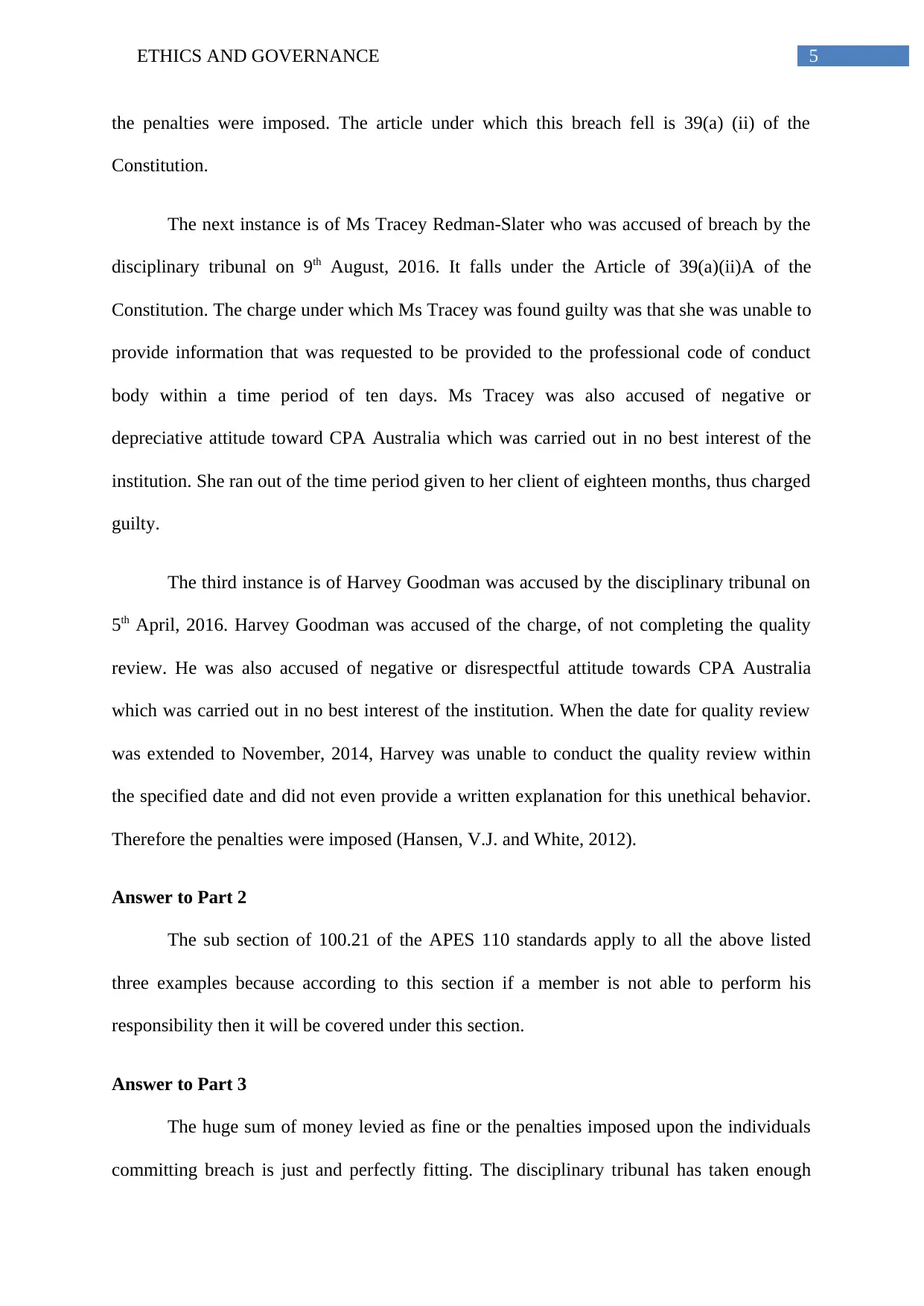
5ETHICS AND GOVERNANCE
the penalties were imposed. The article under which this breach fell is 39(a) (ii) of the
Constitution.
The next instance is of Ms Tracey Redman-Slater who was accused of breach by the
disciplinary tribunal on 9th August, 2016. It falls under the Article of 39(a)(ii)A of the
Constitution. The charge under which Ms Tracey was found guilty was that she was unable to
provide information that was requested to be provided to the professional code of conduct
body within a time period of ten days. Ms Tracey was also accused of negative or
depreciative attitude toward CPA Australia which was carried out in no best interest of the
institution. She ran out of the time period given to her client of eighteen months, thus charged
guilty.
The third instance is of Harvey Goodman was accused by the disciplinary tribunal on
5th April, 2016. Harvey Goodman was accused of the charge, of not completing the quality
review. He was also accused of negative or disrespectful attitude towards CPA Australia
which was carried out in no best interest of the institution. When the date for quality review
was extended to November, 2014, Harvey was unable to conduct the quality review within
the specified date and did not even provide a written explanation for this unethical behavior.
Therefore the penalties were imposed (Hansen, V.J. and White, 2012).
Answer to Part 2
The sub section of 100.21 of the APES 110 standards apply to all the above listed
three examples because according to this section if a member is not able to perform his
responsibility then it will be covered under this section.
Answer to Part 3
The huge sum of money levied as fine or the penalties imposed upon the individuals
committing breach is just and perfectly fitting. The disciplinary tribunal has taken enough
the penalties were imposed. The article under which this breach fell is 39(a) (ii) of the
Constitution.
The next instance is of Ms Tracey Redman-Slater who was accused of breach by the
disciplinary tribunal on 9th August, 2016. It falls under the Article of 39(a)(ii)A of the
Constitution. The charge under which Ms Tracey was found guilty was that she was unable to
provide information that was requested to be provided to the professional code of conduct
body within a time period of ten days. Ms Tracey was also accused of negative or
depreciative attitude toward CPA Australia which was carried out in no best interest of the
institution. She ran out of the time period given to her client of eighteen months, thus charged
guilty.
The third instance is of Harvey Goodman was accused by the disciplinary tribunal on
5th April, 2016. Harvey Goodman was accused of the charge, of not completing the quality
review. He was also accused of negative or disrespectful attitude towards CPA Australia
which was carried out in no best interest of the institution. When the date for quality review
was extended to November, 2014, Harvey was unable to conduct the quality review within
the specified date and did not even provide a written explanation for this unethical behavior.
Therefore the penalties were imposed (Hansen, V.J. and White, 2012).
Answer to Part 2
The sub section of 100.21 of the APES 110 standards apply to all the above listed
three examples because according to this section if a member is not able to perform his
responsibility then it will be covered under this section.
Answer to Part 3
The huge sum of money levied as fine or the penalties imposed upon the individuals
committing breach is just and perfectly fitting. The disciplinary tribunal has taken enough
⊘ This is a preview!⊘
Do you want full access?
Subscribe today to unlock all pages.

Trusted by 1+ million students worldwide
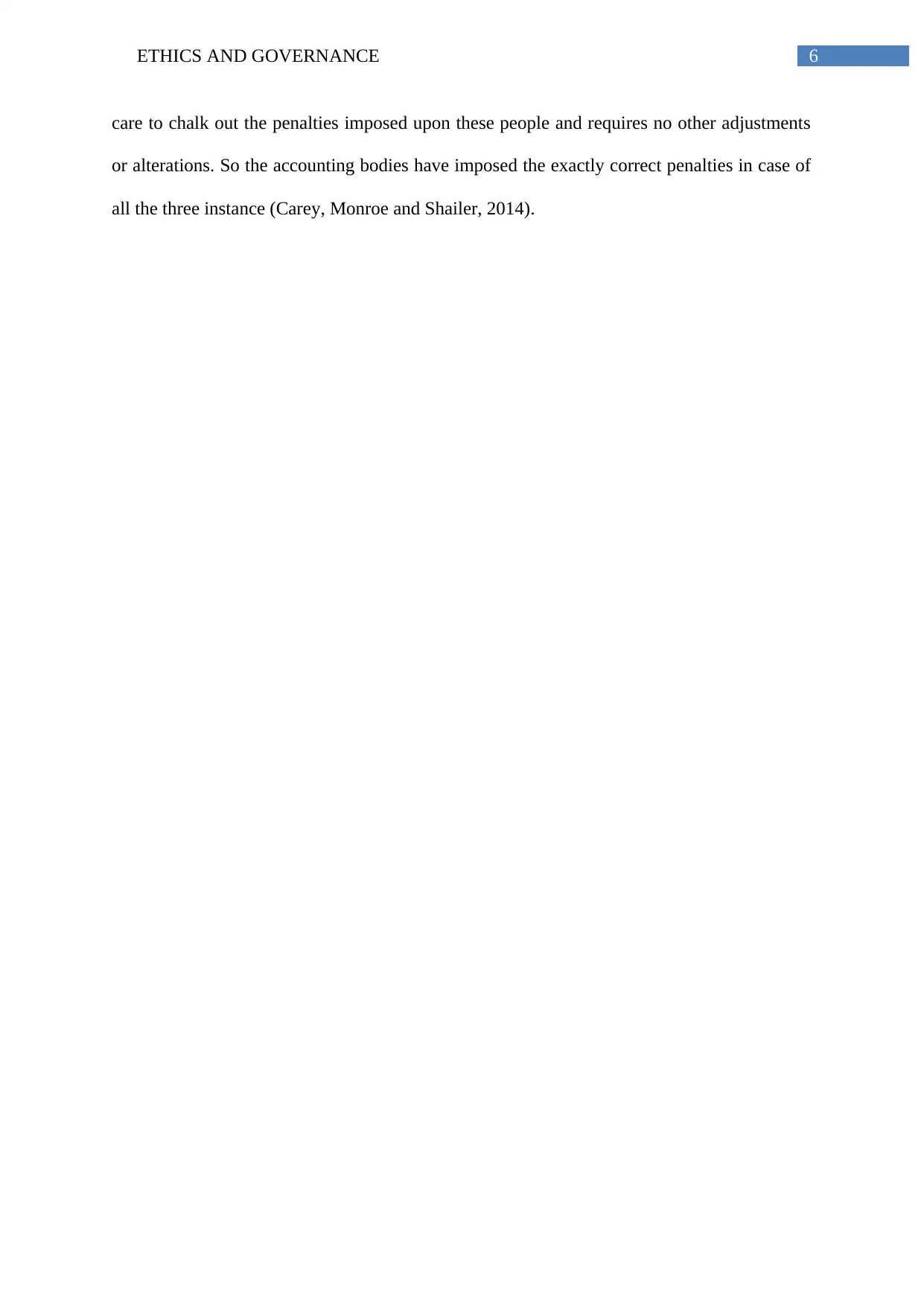
6ETHICS AND GOVERNANCE
care to chalk out the penalties imposed upon these people and requires no other adjustments
or alterations. So the accounting bodies have imposed the exactly correct penalties in case of
all the three instance (Carey, Monroe and Shailer, 2014).
care to chalk out the penalties imposed upon these people and requires no other adjustments
or alterations. So the accounting bodies have imposed the exactly correct penalties in case of
all the three instance (Carey, Monroe and Shailer, 2014).
Paraphrase This Document
Need a fresh take? Get an instant paraphrase of this document with our AI Paraphraser
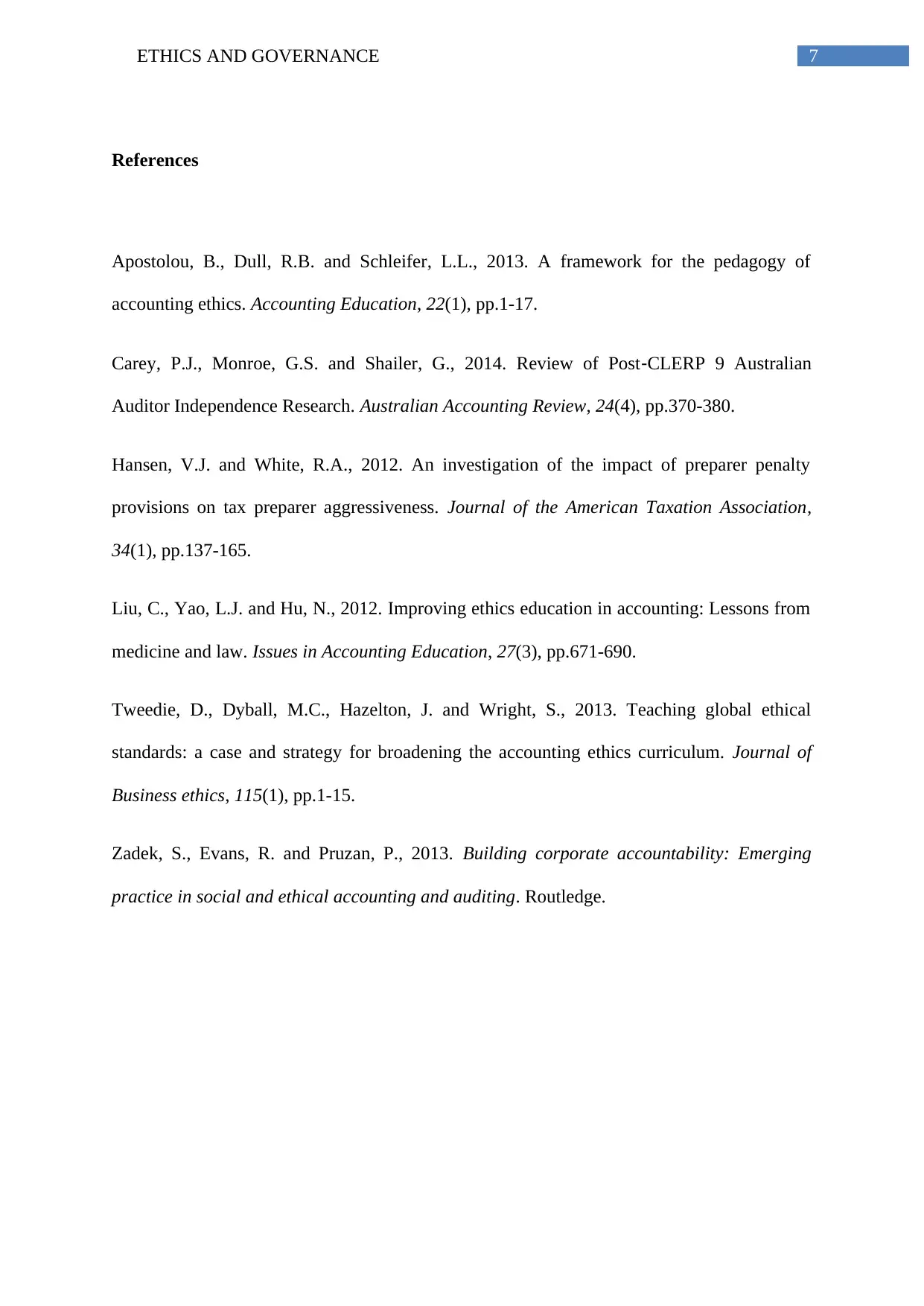
7ETHICS AND GOVERNANCE
References
Apostolou, B., Dull, R.B. and Schleifer, L.L., 2013. A framework for the pedagogy of
accounting ethics. Accounting Education, 22(1), pp.1-17.
Carey, P.J., Monroe, G.S. and Shailer, G., 2014. Review of Post‐CLERP 9 Australian
Auditor Independence Research. Australian Accounting Review, 24(4), pp.370-380.
Hansen, V.J. and White, R.A., 2012. An investigation of the impact of preparer penalty
provisions on tax preparer aggressiveness. Journal of the American Taxation Association,
34(1), pp.137-165.
Liu, C., Yao, L.J. and Hu, N., 2012. Improving ethics education in accounting: Lessons from
medicine and law. Issues in Accounting Education, 27(3), pp.671-690.
Tweedie, D., Dyball, M.C., Hazelton, J. and Wright, S., 2013. Teaching global ethical
standards: a case and strategy for broadening the accounting ethics curriculum. Journal of
Business ethics, 115(1), pp.1-15.
Zadek, S., Evans, R. and Pruzan, P., 2013. Building corporate accountability: Emerging
practice in social and ethical accounting and auditing. Routledge.
References
Apostolou, B., Dull, R.B. and Schleifer, L.L., 2013. A framework for the pedagogy of
accounting ethics. Accounting Education, 22(1), pp.1-17.
Carey, P.J., Monroe, G.S. and Shailer, G., 2014. Review of Post‐CLERP 9 Australian
Auditor Independence Research. Australian Accounting Review, 24(4), pp.370-380.
Hansen, V.J. and White, R.A., 2012. An investigation of the impact of preparer penalty
provisions on tax preparer aggressiveness. Journal of the American Taxation Association,
34(1), pp.137-165.
Liu, C., Yao, L.J. and Hu, N., 2012. Improving ethics education in accounting: Lessons from
medicine and law. Issues in Accounting Education, 27(3), pp.671-690.
Tweedie, D., Dyball, M.C., Hazelton, J. and Wright, S., 2013. Teaching global ethical
standards: a case and strategy for broadening the accounting ethics curriculum. Journal of
Business ethics, 115(1), pp.1-15.
Zadek, S., Evans, R. and Pruzan, P., 2013. Building corporate accountability: Emerging
practice in social and ethical accounting and auditing. Routledge.
1 out of 8
Related Documents
Your All-in-One AI-Powered Toolkit for Academic Success.
+13062052269
info@desklib.com
Available 24*7 on WhatsApp / Email
![[object Object]](/_next/static/media/star-bottom.7253800d.svg)
Unlock your academic potential
Copyright © 2020–2026 A2Z Services. All Rights Reserved. Developed and managed by ZUCOL.





